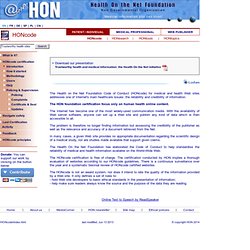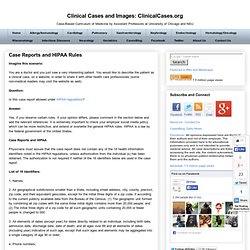

Health On the Net (HON): Health On the Net Code of Conduct (HONcode) The Health on the Net Foundation Code of Conduct (HONcode) for medical and health Web sites addresses one of Internet's main healthcare issues: the reliability and credibility of information.

The HON foundation certification focus only on human health online content. The Internet has become one of the most widely-used communication media. With the availability of Web server software, anyone can set up a Web site and publish any kind of data which is then accessible to all. The problem is therefore no longer finding information but assessing the credibility of the publisher as well as the relevance and accuracy of a document retrieved from the Net. In many cases, a given Web site provides no appropriate documentation regarding the scientific design of a medical study, nor are studies made available that support given claims.
The HONcode certification is free of charge. The HONcode is not an award system, nor does it intend to rate the quality of the information provided by a Web site. ScienceRoll. Will there be a Web 2.0 meltdown?

Definition of Meltdown – 1. a state of complete network overload that grinds all traffic to a halt 2. a disaster comparable to a nuclear meltdown Considering content and community are king, I don’t think a Web 2.0 meltdown is on the horizon. It’s no secret that major players like Google, News Corp, Yahoo and MSN are steadily acquiring various Web 2.0 brands for very large sums of money. Predicting acquisition trends among these companies is not too difficult of a task for any web savvy marketer. Although I just recently started playing around with some different Web 2.0 brands, I quickly witnessed unlimited potential for their continued long-term success. Most current leading Web 2.0 brands fall into what I refer to as, general categories which are comprised of countless sub-categories. The same applies to Web 2.0 brands as the diversify their portfolios introducing sub-categories of their already existing brand’s general or niche category. My conclusion: HIPAA Rules & Case Reports.
Imagine this scenario: You are a doctor and you just saw a very interesting patient.

You would like to describe the patient as a clinical case, on a website, in order to share it with other health care professionals (some non-medical readers may visit the website as well). Question: Is this case report allowed under HIPAA regulations? Answer: Yes, if you observe certain rules. Case Reports and HIPAA Physicians must assure that the case report does not contain any of the 18 health information identifiers noted in the HIPAA regulations, unless authorization from the individual (s) has been obtained.
List of 18 Identifiers: 1. 2. 3. 4. 5. 6. 7. 8. 9. 10. 11. 12. 13. 14. 15. 16. 17. 18. This Website and HIPAA All clinical cases on this website are published in strict compliance with HIPAA. Patient data published on this website is modified and information from several cases may be compiled into one posting for teaching purposes and to protect patient confidentiality. References.